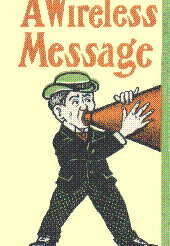-
Thomas H. White's authoritative United States Early Radio History, with overview and links to many key documents and articles about early readio.
- Halper's History of Radio, with brief clips of the 1938 Munich crisis and Roosevelts "fireside chats"
- Merculry
Theatre on the Air: CBS's late 1930s effort to elevate radio is
documented here, with downloads of most of their adaptations of classic
print narratives to radio.

- A World of Wireless: a Dutch History of Radio
|
The Institutionalization of Radio: how does new technology become grafted onto existing culture? |
|
|
Wireless technologies
|
Existing cultural ideologies, forms and practices
|
|
What is happening in the middle space between the zones of "technology" and "existing culture", especially during the heady and feverish early days of radio? Agents: inventors, investors, promoters, "operators,"
hobbiests, etc. engage in
|
|
|
If it works, if the graft of the new technologies to existing social and cultural practices "takes"
|
|
|
Conclusion: two related ideas that emerge from this way of representing the exchange between technology (the formation of objects like 'radio') and culture (the development of new human roles in relation to those objects) 1: That any categorical separation of new technology and larger culture is convenient and conventional, but at a deeper level, is simply mistaken. Technology does not have an exteriority to the humans that dream, fund, counter-sign its new place in the social system. 2: Instituting is non-inevitable: "Radio" does not exfoliate, in some "natural" or inevitable way, from the technology itself, although it may seem that way once a new media system is institutionalized. [e.g. radio takes form as NBC, CBS, etc] Bruno Latour attributes this fable of the inevitable emergence of a new technology to what he calls the "diffusion model" of technoscientific change. To quote Bruno Latour: "First, it seems that as people so easily agree to transmit the object, it is the object itself that forces them to assent. It then seems that the behavior of people is caused by the diffusion of facts and machines. It is forgotten that the obedient behavior of people is what turns the claims into facts and machines; the careful strategies that give the object the contours that will provide assent are also forgotten. …the model of diffusion invents a technical determinism, paralleled by a scientific determinism. Diesel's engine leaps with its own strength at the consumer's throat, irresistibly forcing itself into trucks and submarines."(Science in Action, 133). We could adapt: radio for engine, home for trucks… Latour mocks the odd genealogies produced by histories of technology, by which facts and machines mate and converge by themselves (for example, phonography + photography = sound film; video + broadcast radio = television). To make the diffusion model more persuasive, a leading role is given the single great genius inventor/ originator: e.g David Sarnoff as the "father of radio" struggling to overcome resistance of those who don't grasp the future of radio. (others: Edison; Gates) Discussion of this model for understanding the institution
of radio. |
|
Return to Home Page for Professor Warner's The Theory and Cultural History of 20th Century Media (Department of English, UC/ Santa Barbara, 2002)
